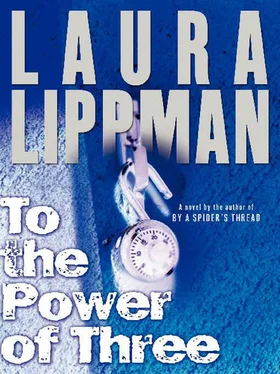There were three girls. For ten years they were best friends who did everything together. Then they weren’t, and then they didn’t. It was only in how their friendship ended that there was anything singular about them.
In April of junior year,Kat checked her SAT scores on the Internet and found that they were still stubbornly short of the 1400 mark. “Short” was a euphemism: At 1340 she was closer to 1300 than 1400, and even 1400 was a far cry from the 1500 that her father said would make her a “lead-pipe cinch” for Stanford.
“Lead-pipe cinch,” Perri said when Kat repeated her father’s phrase. “What does that mean? I mean, why does it denote a sure thing?”
They were all a bit obsessed with words and meanings and analogies at this point, having spent the past three years preparing for their college boards. They had taken practice tests freshman year, taken the PSATs twice, studied vocabulary lists in English this year, then taken the SATs twice. But of the three, no one had spent more time preparing than Kat.
“Some building term, I suppose,” Kat said. “Anyway, I’m not too worried. I think being ranked number one in the class balances my SATs.”
Her confidence didn’t seem a put-on. With help from her father’s girlfriend-an accomplished Stanford alum in her own right-Kat did appear to have everything else she needed for a spot at the school: straight-A grades, a sheaf of recommendations, a list of extracurricular activities that signaled her breadth and diversity. Even the news that Binnie Snyder planned to apply there was of little concern, because Kat was going early decision and Binnie was spreading her applications out, targeting all the big math-and-science schools-Caltech, MIT, Berkeley. Besides, Binnie was a math nerd. She didn’t have the all-around profile that Kat had cultivated.
But Kat’s calm assurance shattered when she learned that Binnie had signed up to take an advanced calculus course at community college that summer-and that she would be given high-school credit. Under the byzantine system that Glendale used to calculate class ranking, this would make Binnie number one and drop Kat to number two. Again Kat insisted she was not worried, but she was far less convincing this time. Whenever the girls got together the spring of their junior year, the topic was sure to surface, with Kat seeking her friends’ reassurances, then saying she didn’t need them.
Her usually mild-mannered father was apoplectic, complaining that Kat was being cheated out of an honor for which she had been preparing since middle school. “We’ve been outscheduled,” he told his daughter. Her father even met with the principal and tried to persuade her that no credit should be given for outside coursework. He offered to underwrite a scholarship at the school, in his family’s name, and back it with a large donation. But while Barbara Paulson took Mr. Hartigan’s money, the only thing he accomplished was getting the school to scuttle its traditional vale-dictorian/salutatorian roles. There would still be a number-one ranking as far as colleges were concerned; it just wouldn’t be announced at graduation.
“You’re still applying early decision,” Perri told Kat after she confided in her friends, embarrassed by her father’s interference, but also visibly disappointed that he hadn’t been able to change the principal’s mind. “They won’t know Binnie is number one until long after they’ve accepted you.”
“I know, but number one makes much more of an impression,” Kat said. “Being number two just leads people to wonder how much better number one might be. It’s the damn reading comprehension. I’m too nervous to concentrate. I can zip through the vocabulary, and I was fine in the timed trials I did with my tutor. But my brain locks up on test day.”
Josie, whose board scores were a mediocre 1260, said nothing, but she understood Kat’s dilemma. Her old choke mentality had resurfaced in these tests, although her parents insisted they didn’t care. Perri, meanwhile, had scored an enviable 1550 but had the good taste not to mention it. If anyone was a lead-pipe cinch, it was Perri for Northwestern’s theater program.
“It’s not going to matter,” Perri said staunchly. “You’ve got a stellar application. You’ll be okay.”
“I know.” Kat sighed, stabbing her Frappuccino with her straw. “I just always thought I’d be number one.”
They were in a new Starbucks several miles south of Glendale. Now that they had licenses and cars-well, Kat and Perri had cars, Josie had only a license-they no longer met at each other’s homes or in the woods behind Kat’s house. They drove to the mall, the good one with the upscale department stores, or to restaurants that treated the high-school crowd hospitably.
Driving had opened up the whole world to them in the past year, although they seldom traveled more than five or ten miles from Glendale. Once, just once, Josie had borrowed her father’s car and taken the girls down to South Baltimore, the neighborhood of her pre-Glendale life. But the streets were narrow and all the parking was parallel, and the girls were a little stunned at the sight of homeless men slumped in doorways along Light Street. Josie could sense the energy and eccentricity that would have beguiled her parents when they were young, but she was thankful her family had left for Glendale. She would not have wanted to grow up here, with its no-name stores and littered streets.
“I’m telling you it doesn’t matter,” Perri said. “Besides, it’s not a done deal. You could take summer classes, too.”
“No, I can’t. I’ve already signed up to work at a summer camp for disabled kids.”
“She still hasn’t taken the class,” Perri said. “Anything can happen. She could drop out, or not get an A.”
“Ever since middle school, Binnie’s been a straight-A student,” Kat said. “I only stayed ahead of her by taking so many AP courses. I liked her better when she was a math genius.”
“We never actually liked her,” Josie pointed out.
“Well, you know what I mean. Why couldn’t Binnie be satisfied being this huge math brain and a National Merit Scholar? Why did she have to turn it into a competition?”
The girls sucked on their drinks. Josie’s mom liked to joke that Starbucks was the malt shop of Josie’s generation, but coffee drinks were so much more sophisticated.
“Well, it hasn’t happened yet,” Perri reiterated. “And there’s nothing you can do about it.”
“Nothing?” Kat, like Josie, believed that Perri had a plan for everything. In fact, Josie realized, Kat had been fishing, trying to get Perri to solve her problems, as Perri usually did.
“Not that I can see. Like I said, she might change her mind about taking the summer course if something better comes along, like a hot job. She might not get A’s. She could fall in love with some guy or have a nervous breakdown. But it’s out of your hands.”
The conversation had not seemed important at the time. Even a month later, after the pigs were killed at the Snyders’ farm, it didn’t seem notable to Josie. Summer came, and they went off in various directions-the camp job for Kat, a mother’s-helper gig for Perri, a mall job for Josie, who was trying desperately to earn money now that she knew the story of her compromised college fund. Things seemed normal enough when school resumed, but then this strange iciness set in Perri. She stopped speaking to Kat altogether, and when Josie begged her to tell her what was wrong, she referred her back to Kat, who said she had no idea what Perri’s problem was.
“Perri’s crazy,” Kat said. “There’s no talking to her. She’s probably still pissed that I got the part she wanted in the school musical.”
Читать дальше












